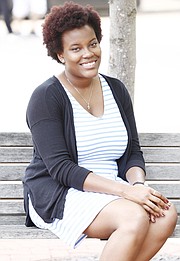One thing everyone told me before I left for college is to always protect myself. Be aware of my surroundings, travel in packs, walk only in well-lit areas—the same diatribe heard for generations. It's almost like a rite of passage bestowed upon women—a pink keychain of mace and self-defense devices disguised as kitty-cat ears. It's particularly true for those of us who dared to enter into college, a space where men inevitably occupy close personal space.
One thing no one told me before college was the number of women I would encounter who'd followed the rules of their elders, traveled in packs armed with their little pink keychains and still found themselves the victims of senseless acts of violence that happen too often and remain a secret until late one night, crammed 12 to a dorm room over pizza rolls and Netflix.
I'm never sure why people open up to me, but I've found myself the keeper of all secrets—though I have plenty myself—and have managed to protect every woman who's bared her soul to me. I've heard the details of how a man invited the girl across the hall from me to a party and dated-raped her there. I remember sitting on the bathroom floor of my dorm with my best friend after she broke down about her ex-boyfriend who abused her throughout her high-school career, and how, years after ending all contact with him, she still suffers from extreme anxiety and depression.
By the eighth person to tell me how she had been abused when she was 10, 12 or 22, I realized that the world isn't set up to protect the interests of women. I didn't understand how someone could be brutally attacked in a parking lot that's patrolled constantly. Or even how, days later, there was another story ruminating through the underground, hushed whispers and subtweets over the timeline: "She was so drunk. She didn't know what she was doing." The posts sometimes included a link, a twitpic, and the victim's Twitter handle, Instagram account or Facebook profile—everything admonishing and exposing her, but never any consequences for the perpetrator.
No one told me that I would subject myself to being put on display while walking to my morning lecture, coming back from the gym or heading to work at 5 a.m., through the parking lot with my sleeve pulled over trembling fingers, my index finger at the ready on my pepper spray. Only twice in my four years at college was I ever afraid that I was in serious danger, and while I'm known to be naive or just stupid and walk across campus after dark (strictly toward a destination, no less), that's no excuse for the men who've stopped, made eye contact and turned to walk toward me, feeling that they have the right to harm me.
As a woman, I'm hyper-aware of my surroundings at all times, of who I let into my car, my dorm suite, my study room in the far corner of the library—places where assaults can and have happened. These are supposed to be safe places, but at any minute, they can turn into a nightmare.
As a woman, I know it's not my responsibility to make excuses for abusers, but rather offer comfort to victims. That's the main thing that college taught me. I have so much respect and compassion for every person I meet, and a little extra kindness for my fellow friends who have experienced something traumatic. I've been willing to start dialogues with friends about abuse, rape culture, patriarchal values and feminism, and through that, have been able to help those heal and even move past my own experiences.
It's through hearing the heart-wrenching, stomach-churning stories that I'm able to sort through narratives about college. One seems to be both prevalent yet hidden, treated like an urban legend: "Assaults happen; they just don't happen here." As young adults, we must be mindful of the spaces we create for people, especially young women, and be cognizant of the dialogues we're having or need to have. I believe that the only way to change the narrative is to use our voices, and when the time comes, whether it's 2 a.m. in the soft fluorescents of a dorm room, or during an afternoon study session, be willing to listen.
Maya Miller is a former JFP intern and now a freelance writer. She's learned that adulthood means choosing her own bedtime, and she's not equipped for that responsibility just yet.



Comments
Use the comment form below to begin a discussion about this content.
comments powered by Disqus